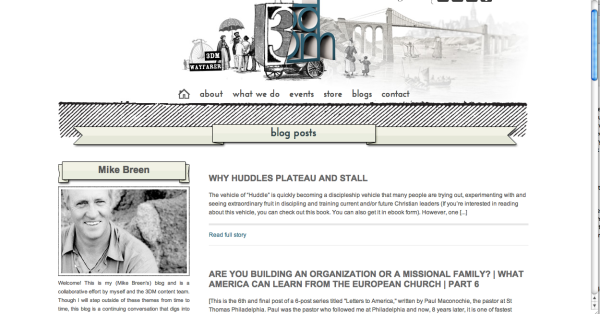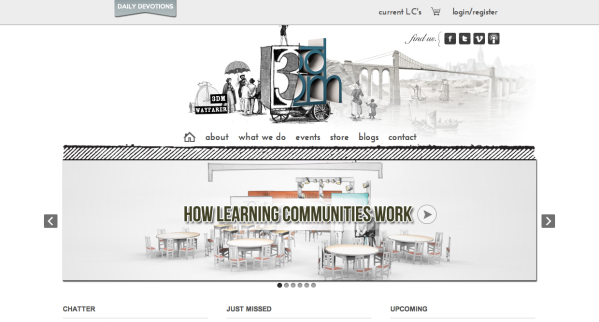My blog location has changed!
As we have launched 3DM’s new website, the location of my blog (and a few other writers) is now being hosted on the 3DM website which you can access by clicking here. You will still be able to access all of my previously written posts and the new content we put out each week.
Also, we have tried to take our whole database of people who were previously getting email updates when new blogs were released and imported it into the new blog. So, if you were receiving an email before, you should still be receiving one. If not, feel free to input your name on the left side subscription tab and it’ll put in in.
Thanks everyone for bearing with us in this transition!
You keep saying “Persons of Peace” were Jesus’ most strategic tactic for evangelism. How does it work?
Each week, via a short, 2-3 minute video we try to answer one practical question that we hear lots of people asking. Our hope is that these will be helpful, but will also spur on conversation and more questions in the comment section. If you want to keep digging around with questions related to this topic, post the comment, and we’ll be interacting with these daily.
Today’s question is answered by Jo Saxton, who I’ve known for more than 17 years and who has served on my teams for almost that long. She is a BRILLIANT leader and for this post is looking to explain Jesus’ most strategic (yet simple) evangelism tactic: Persons of Peace.
The new 3DM website is live!
We had a few hiccups this week transferring our internal tester site to our live WeAre3DM website, but it’s live and looking great! It’s been 6 months in the making and we couldn’t be more proud of the team who’s been working on this.
This is PHASE 1 of the website and we’ve got a couple of exciting wrinkles set to come in the next 6-12 months. But in the mean time…enjoy.
Check out the all new weare3dm.com by clicking here.
Do pay increases undermine missional leaders?
The following is a brief excerpt from my forthcoming book Multiplying Missional Leaders, which comes out at the beginning of May.
Missional leaders will need to embrace a more Kingdom-oriented understanding of how God says our world functions, both in terms of why we’re here in the world and more specifically, in terms of how we make decisions. I believe that scripture lays out a proper ordering of our priorities:
1. Our covenant with God, our Father
2. Our covenant with our spouse and kids
3. Our missional calling and family: Where and to whom am I currently called?
4. Our job
I don’t think this is a revolutionary list until we get to the third point. That’s because in this list I am suggesting that a person’s calling to missional leadership should dictate the type of job that person has and where it’s located.
 I cannot count the number of people over the years who have felt called to our community and to a specific missional endeavor in that place but chose to leave the city and move for an annual pay increase of $5,000 or $10,000. They feel called to one place and people and mission, but leave it for a pay increase. Let’s be very clear about what they said when making that decision: “Five to ten grand a year is worth more than the missional calling God has placed on my life and the family I
I cannot count the number of people over the years who have felt called to our community and to a specific missional endeavor in that place but chose to leave the city and move for an annual pay increase of $5,000 or $10,000. They feel called to one place and people and mission, but leave it for a pay increase. Let’s be very clear about what they said when making that decision: “Five to ten grand a year is worth more than the missional calling God has placed on my life and the family I
was serving with.”
That is, quite literally, what their life is saying.
I’ve seen more pastors than I can count make that exact same decision. When we do this, we are using the values and the metrics that the world considers important to dictate our decisions instead of Kingdom realities. The Kingdom reality is that we have a Father who says, “Look at the birds in the air. I take care of them. Won’t I take care of you?”
Look. I’m not suggesting we work for ridiculously small amounts of money to the point where we can’t take care of our family. That would violate our covenant with our spouse and kids, which is a rung above our specific missional calling. But I am saying that time and time again, people make decisions based on money, stuff, opportunity, glamour, celebrity, consumerism, or ambition rather than asking where God is calling them to go. Missional leaders simply have a different way of making decisions, and so you would be wise to shape this Kingdom reality in the missional leaders you are training.
Let’s look at a practical example. Let’s say one of the missional leaders in your Huddle is offered a promotion for more money. Awesome. That’s great. Anyone’s knee-jerk reaction would be, “Take it! Take the money and the promotion and keep moving up the corporate ladder.”
But these would be questions I’d want to ask this missional leader:
- If you take this job, will you be able to be faithful to your covenant with God? Will you still have time to spend with him? Will you still be in a place where you work from rest, rather than rest from work?
- How will taking this job affect your family? Will it bring more stress? Will you still get quality time with your spouse and your kids? Will you still have time for family activities that you do together?
- Will you still have the availability to serve the people you feel God is calling you to serve? What would change? Are you still being called to serve these people?
- Is the increase in money and stature worth whatever decreases may come with it?
What we are doing in situations like this is helping the missional leaders we are training to live with a Kingdom understanding of how we order our lives and make decisions. We don’t answer to money. We don’t answer to stuff. We don’t answer to ambition, and we aren’t slaves to our appetites. We answer to God.
My friend Todd Hunter puts it this way: “You are an agent of the Kingdom cleverly disguised as an attorney (or artist, or banker, or stay-at-home mom, or electrician, or pastor, etc).”
I believe this is a crucial area to address for all missional leaders, because it’s one of those subtle things that our enemy uses to dull our effectiveness. Seriously, how brilliant is this? He sees that someone is starting to get some missional traction, and so he gets him or her a $7,000 raise across the country that takes him or her out of the game for a couple of years. We have to see that this is happening all around us and help our leaders see this reality.
Again, this isn’t to say raises aren’t good or that moves aren’t appropriate. But as missional leaders living in a Kingdom reality, we measure things differently, yes?
Are you building an organization or a missional family? | What America can learn from the European Church | Part 6
[This is the 6th and final post of a 6-post series titled “Letters to America,” written by Paul Maconochie, the pastor at St Thomas Philadelphia. Paul was the pastor who followed me at Philadelphia and now, 8 years later, it is one of fastest growing churches in Europe, doing some incredibly imaginative things in a truly post-Christian context. I hope you enjoy the series, and if you’d like to read a little on the history of St Thomas, check out this blog post on how I chose Movement over Mega.]
- To read Part 1 of this series, “From Intervention to Incarnation,” click here.
- To read Part 2 of this series, “Do yourself out of a job,” click here.
- To read Part 3 of this series, “Bigger doesn’t mean better,” click here.
- To read Part 4 of this series, “We must expect different things from our Pastors,” click here.
- To read Part 5 of this series, “Is church about the superstar pastor?,” click here.
One of the things that impacts an Englishman most when visiting American churches, particularly megachurches, is the sheer size, scope and excellence of the organisations that make them work. If you are a gifted and anointed Pastor in the UK you might see a church of several hundred grow under your ministry, but rarely more than this. Of course this means that you never learn the skills of the American megachurch Pastor, who typically leads a multi-million dollar set-up with multiple employees and teams. In fact, one of the things that we have began to learn over in the UK from you guys is that good business principles can equally apply to church leadership. At St. Thomas’ Church, our world was rocked when we read Jim Collins’ ‘Good to Great’.
However, in the bid for excellence and in the process of building well-run and professional organisations, I wonder if something has been missed.
I have spent time with several teams from churches in the USA over the last few years and in general I have been really impressed with the way they work. However, team members sometimes talk about feeling discouraged about the level of pressure they are under to perform well. To be honest, in some instances, they can seem overtired and even somewhat disconnected from the Senior Pastor. In our celebrity culture, Senior Pastors can sometimes seem to be remote and unobtainable ‘super-people’ living in a different world.
As we try to provide an excellent experience for the people who come on Sundays, we can put a level of pressure on our staff members that makes them vulnerable to discouragement, temptation and burn-out.
But if they are already teetering on this level of discouragement, temptation and burn-out, what happens when you start talking about starting new “missional” things outside the four-walls of the church building?
When we look at the ministry of Jesus, he also had a discouraged team at times. As His ministry built there was increasing resistance from the Pharisees and the teachers of the law. The work with the crowds was relentless and the disciples all became pretty tired. Being with Jesus and seeing His perfect walk with His Father also brought them face to face with their own sin; at one point Peter even said “Get away from me Lord; I am a sinful man.”
Jesus could easily have seemed remote and unobtainable. But this was not the case. Why?
When His disciples began to get discouraged and tired, He drew them in. If you look at the second quarter of the synoptic Gospels, you find Jesus going to great lengths to get away with the twelve and spend time just with them. He even dismissed the crowds while the disciples sailed across the lake of Galilee and then walked on water to get to His disciples before the crowds could reach them! (John 6: 16-24)
He gave them His time when they were discouraged and He spoke vision and grace to them. He said: “Don’t be afraid, little flock; for the Father has been pleased to give you the kingdom.” (Luke 12:32)
In doing this, Jesus demonstrated to His team that He was not just a boss, but a Shepherd that would lay His life down for the sheep. He built a level of relationship with them that moved them past being a group of workers trying to achieve a task (however worthy the task was) into a tightly-knit family who could be vulnerable with each other and who had a huge level of loyalty to Him and to each other. He got them to the stage where He could say “Here are my Mother and my Brothers” (Mark 3:33) and “I used to call you servants, but now I call you friends.” (John 15:15)
Back when I was a more junior member of the team at St. Thomas’ Church responsible for one of the morning services, I remember getting really tired and discouraged. At that point my Senior Pastor, Mike Breen, seemed to get a sudden interest in cinema. He kept asking me to go and watch movies with him. Of course the way it worked was that we drove to the cinema, had a drink before the movie started, and drove home again afterwards, talking all the while. What he gave me during those times was absolutely key: Vision for the future, a reminder that our success depends on God’s grace and a level of relationship with him that meant that I was not isolated.
During the difficult times and the discouragement when we are all tired, team can become family.
But only if the leaders are prepared to make the sacrifice and change their schedule enough to coach us through.
Hey, Pastors – are we managing an organization or building a missional family?
Paul, along with Rich Robinson, are spearheading much of the 3DM efforts in the UK. To check out their blog, click here.
Weekend links
Here’s a short list of some of our favorite blog posts, articles and videos from this past week from 3DM bloggers and others around the web.
- Donald Miller on turning fact into fiction (Blue Like Jazz opens this weekend)
- Is church about the superstar pastor?
- Is the WHO of church planting more important than the WHAT?
- Church’s easter plan: Win a BMW, stay for the Gospel
- New A.I. on the brink of something special?
Each week, via a short, 2-3 minute video we try to answer one practical question that we hear lots of people asking. Our hope is that these will be helpful, but will also spur on conversation and more questions in the comment section. If you want to keep digging around with questions related to this topic, post the comment, and we’ll be interacting with these daily.
Today’s question is answered by Eric Pfeiffer, our Director of Coaching at 3DM. It’s hard to imagine many people more gifted at coaching top-shelf leaders than Eric and he provides some great insight in this post on what you do if someone is hurt and/or offended if they weren’t picked for your Huddle.
Is your family worth imitating?
My friend Chris Norman said this a little while ago and thought it was worth posting:
Discipeship is about whether you have a life worth imitating.
Oikos [your extended family on mission] is about whether you have a family worth imitating.
I wonder how many of us are living in such a vibrant, healthy, missional extended family (probably 20-40) that when people see it, they see a family they’d like to be part of. That when they see it, they’d want that kind of family, but could also model what they do in their family based on what they see in yours?
Is Church about the Superstar Pastor? | What America can learn from the European Church | Part 5
[This is the fifth post of a 6-post series titled “Letters to America,” written by Paul Maconochie, the pastor at St Thomas Philadelphia. Paul was the pastor who followed me at Philadelphia and now, 8 years later, it is one of fastest growing churches in Europe, doing some incredibly imaginative things in a truly post-Christian context. I hope you enjoy the series, and if you’d like to read a little on the history of St Thomas, check out this blog post on how I chose Movement over Mega.]
- To read Part 1 of this series, “From Intervention to Incarnation,” click here.
- To read Part 2 of this series, “Do yourself out of a job,” click here.
- To read Part 3 of this series, “Bigger doesn’t mean better,” click here.
- To read Part 4 of this series, “We must expect different things from our Pastors,” click here.
When Mike Breen led our church in Sheffield, UK, he introduced a number of important concepts to us. We began to grasp that we’re all missionaries, even if we’re living in our home city. We learnt the importance of raising up people into positions of leadership so that our groups could grow and multiply. And we took hold of living an ‘extended family’ lifestyle, living life-on-life with each other and finding ‘people of peace’ (Luke 10) to disciple. During the 1990’s we saw substantial growth as a result, becoming one of the largest churches in the UK.
I became the Senior Pastor of St.Thomas’ Church in 2004 and during the next three years almost the entire senior team left and we saw almost no growth at all.
Can you imagine how that felt?
It was pretty grim to be honest. By the fall of 2006 I was in hospital with a serious back problem and I was feeling stressed (to say the least).
There were two things I needed to learn.
The first was that I am not Mike, and I needed to stop trying to be him. Mike had already told me this many times, but I began to really understand what this meant. I’m an introverted prophetic leader, always asking the question ‘What is God saying to us?’ My personality, my way of interacting with God and with the team was very different to Mike. But I was trying to be an extroverted, apostolic leader (who asks the question “How do we build a movement?) And it just wasn’t working.
The second thing was that our new generation of Missional Community Leaders needed to stop trying to be the first generation. Our early Missional Communities had grown under the leadership of some very gifted people who had made leading 40-50 people in their spare time look easy. Most of these early leaders are now successful church or business leaders themselves; visionary pioneer types who quickly latched on to the ideas Mike was preaching and made them work. But a lot of the new generation of leaders were, necessarily, every day folks who had been raised up within the communities and had stepped up into leadership positions. Many of them were pastors or teachers who loved to look after people but found it hard to be really intentional or strategic.
As I came out of hospital and started to engage with leading the church again, the phrase we started to use was ‘no longer one size fits all‘. We started to ask the question ‘This is my call, what is yours?‘ We also reduced the average size of our Communities down to around 30 adults instead of 40-50, which meant they had to multiply more often.
Of course, Missional Communities never were ‘one size fits all’, but we needed to release people from the concepts they had in their heads of what a Missional Community ‘should’ be. The fundamental questions we wanted the leaders to ask, and to answer, were
- What is God saying to us?
- Who is He calling us to reach?
- How is He calling us to live as a community?
Once people could start to answer those questions, then we could hold them accountable that they actually did what God was calling them to do. We could train them and help them to be effective in their community life and their missionary endeavors.
Groups started to blossom everywhere. Missional Communities reaching out to suburban neighborhoods, urban housing projects, outward-bound activity groups, soccer teams, university students. Others focused on supporting each other in the work place or in businesses, or reaching out through their teenage children or their elderly relatives in nursing homes. Over the next five years we quadrupled in size in Missional Communities. So far this momentum has continued; we grew by as much this year all over again.
When I look at the church in the USA I see many examples of huge congregations that have gathered around the amazingly gifted teaching of ‘superstar’ Pastors. The numbers of people who gather are impressive, but I cannot help asking the questions:
- Are the people taking hold of a vision from God and living to bring it into being? Are they being released and equipped enough to be able to do this?
- Are the leadership teams of churches effectively holding the people accountable to the vision God has given them and helping them to fulfil it? Or are they just asking them to listen to teaching, help with programmes and pay their tithes?
However we do it, I believe that building a culture of low control (what is God saying to you?) and high accountability (what are you going to do about it?) is essential if the Church is to become all that she has been designed to be and if we as Christians are to begin to look like Jesus Christ.
Paul, along with Rich Robinson, are spearheading much of the 3DM efforts in the UK. To check out their blog, click here.
Weekend links
Here’s a short list of some of our favorite blog posts, articles and videos from this past week from 3DM bloggers and others around the web.
- We must expect different things from Pastors
- How I learned to teach/preach and what it’s teaching me today
- Facebook, Mark Zuckerberg and Leadership (from Fast Company)
- Why movements in the church often fail to catalyze
- What does the young adult ministry of the future look like?
- America’s tiniest town sells at auction
- Why are fewer young adults getting drivers licenses? (Atlantic Monthly)


